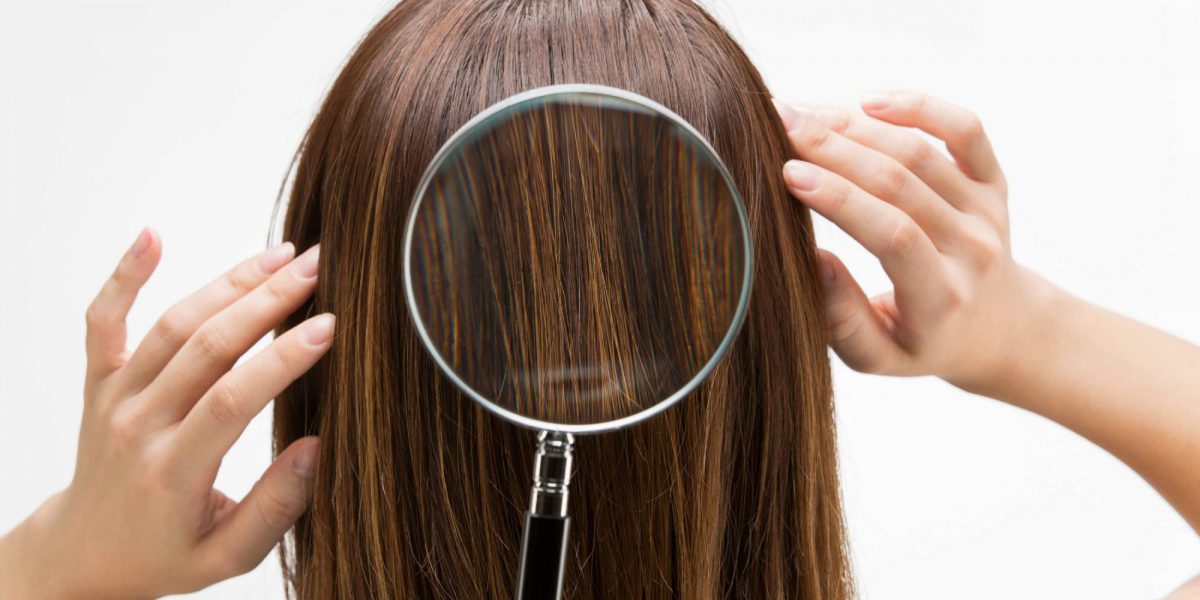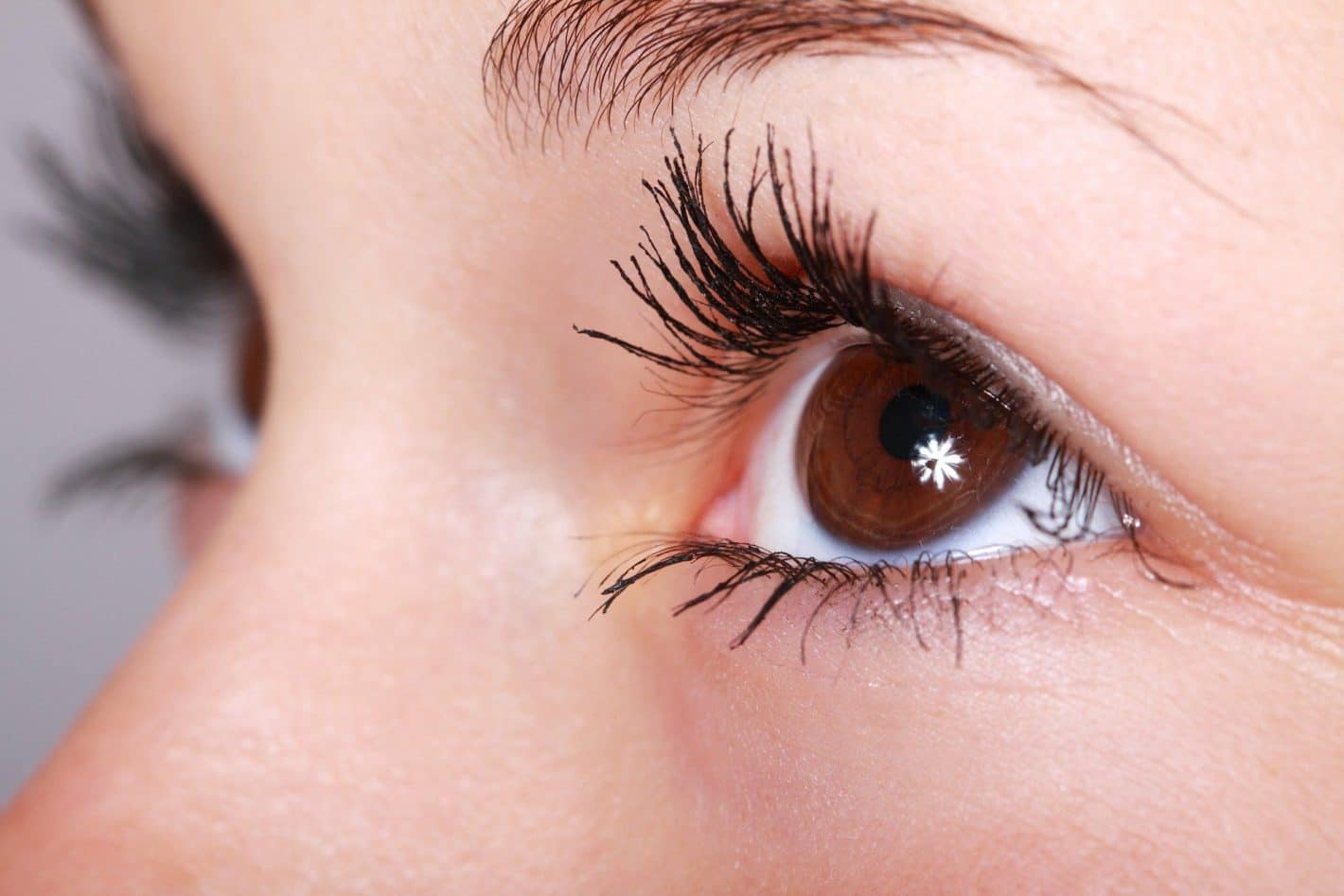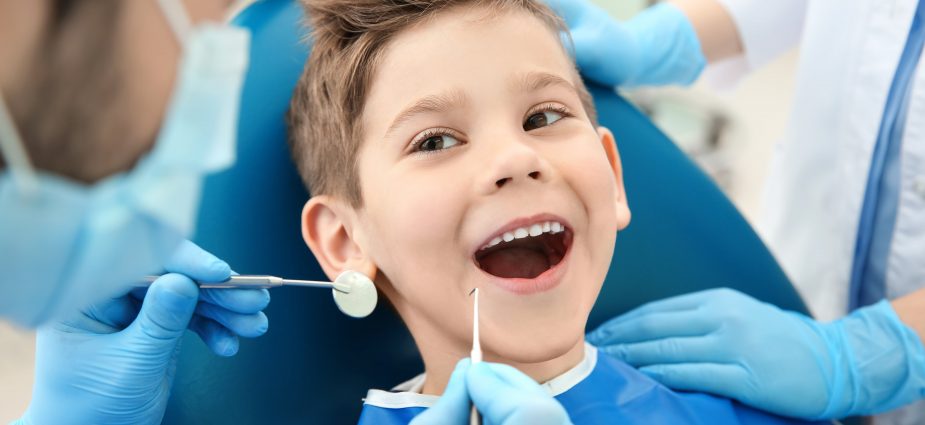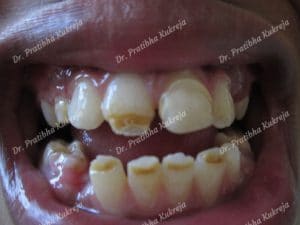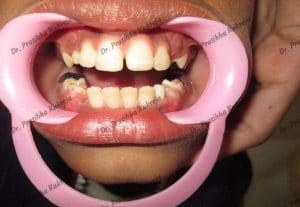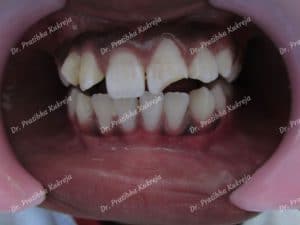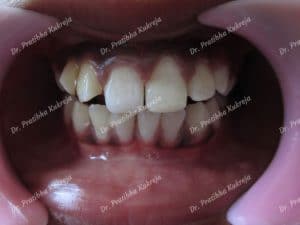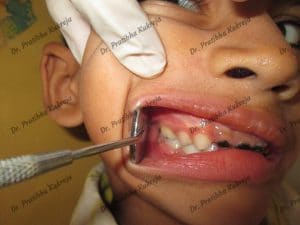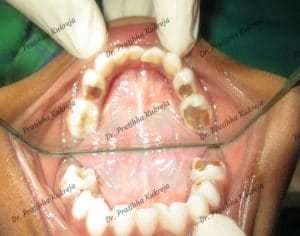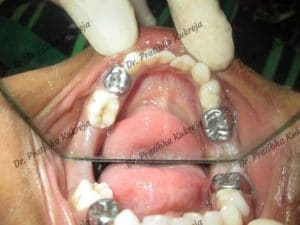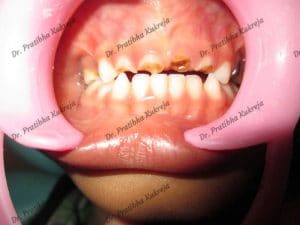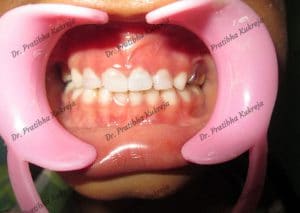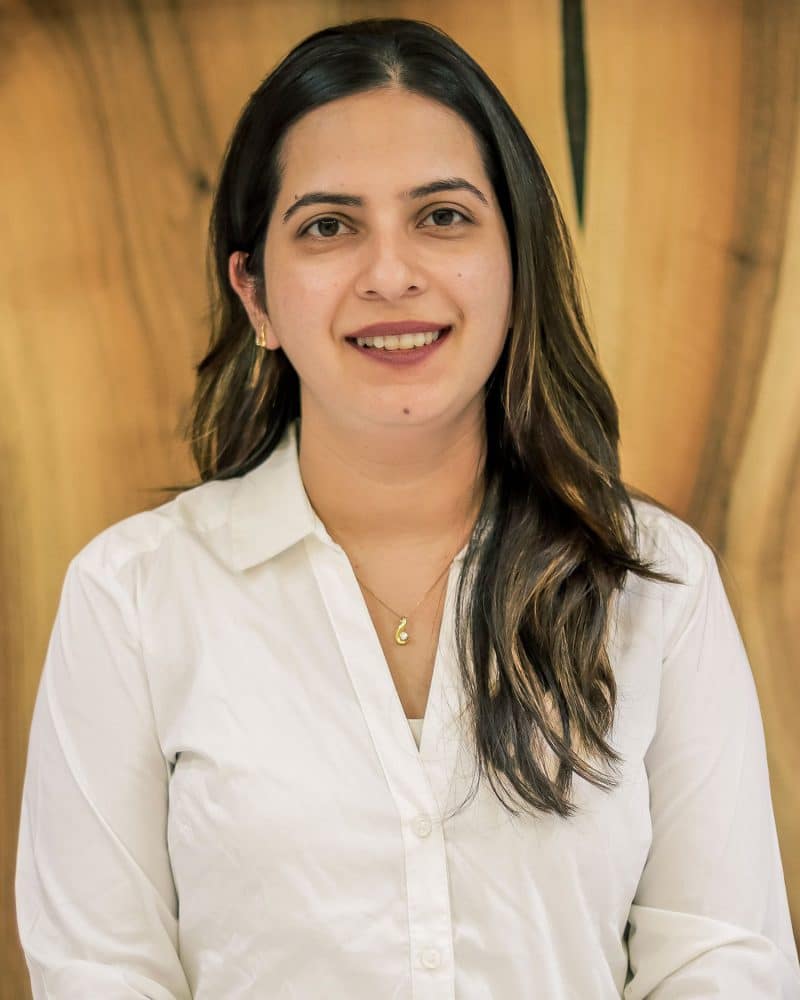Pediatric General Dentistry
- Home
- Pediatric Dentistry
- Pediatric General Dentistry
We offer regular dental check-ups for kids, dental x-rays, dental cleanings, pulp therapy, dental fillings and crowns, pediatric prosthodontics
- Home
- Pediatric Dentistry
- Pediatric General Dentistry
About Pediatric General Dentistry
Pandit Clinic’s pediatric general dentistry covers the basics of good oral care and health. Following services fall under general dentistry for kids:
Dental Check-up For Kids
We offer regular dental check-ups for kids, teenagers and special needs children. At a dental check-up, the doctor will examine your child’s teeth, jaw and oral tissues. We will also consider other factors and let you know if they anticipate any oral problems for your child in the near future.
Dr Pratibha Kukreja – Pandit will share the report of the check-up with you and her diagnosis. If the child is given a clean bill of oral health, then there is nothing further. In case problems are detected, the doctor will share her treatment course with you and begin with the next steps.
Pandit Clinic recommends a minimum of two dental check-ups per year. This frequency, along with good oral care habits, can lead to a healthy childhood for the kids.
Hypomineralized Teeth: Why is Early Intervention Necessary
Dental X-Rays
At Pandit Clinic, we pride ourselves on having the best technology and equipment for our patients’ needs. Our Pediatric Dentistry practice is equipped Vistascan by Durr Dental, the most advanced, fine, digital and paperless x-ray imaging system at present.
Dental X Rays can detect cavities, decayed teeth, bone diseases, they can predict the pattern of erupting teeth and much more. Dental X Rays allow a doctor to get a clear vision of the patient’s condition. They are used to plan the child’s oral care treatment.
While most disease progressions are visible on these x rays, sometimes some dental diseases require more understanding by means of OPG (Orthopantomograph) in children and Cone-beam computed tomography (CBCT). Whenever relevant, these are advised.
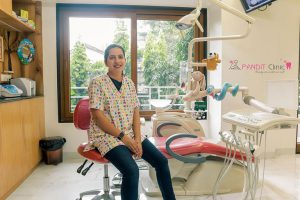
Dental Cleanings
Children need dental cleaning sessions at regular intervals. Children’s teeth tend to pile on deposits as time goes by. At a dental cleaning session, we remove the stains, tartar and plaque from their teeth. This session helps in restoring the teeth to their original pearly white color and texture.
Regular cleanings can help the doctor in locating problem areas well ahead of time. Dr Pratibha Kukreja Pandit also uses this time to educate children on good oral care habits.
Cavity Management Treatments: What Is A Cavity?
A cavity is a hole that has formed inside the teeth. Cavities are permanent in nature. They need correct dental treatments to avoid the escalation of a cavity into a decayed tooth.
Cavities are caused due to various factors including frequent snacking, sugary foods and drinks, and most importantly, not cleaning your teeth well. Children are most likely to have cavities in their teeth. Therefore, they need cavity prevention and management treatments on time to avoid further escalation of the problem.
Even though we emphasize on preventive treatments, sometimes we need to opt for restorative procedures for our patients. Our Cavity Management Services are a part of the restorative spectrum of kids dentistry. Kids need these treatments when the cavity has permanently set into the tooth. Restorative procedures are the only way to stop the tooth from further degradation and decay.
How Do We Treat Permanent Cavities?
At Pandit Clinic, we trust Dental Fillings to take care of cavities and prevent tooth decay. Dental Fillings are safe and simple procedures. Our Pediatric Dentist uses Dental Fillings to restore the original structure of the tooth and its size. The Fillings are made of durable material that can withstand the stress of chewing.
Different Types Of Dental Fillings At Pandit Clinic:
-
Glass Ionomer Cement Restorations:
Glass ionomer cement, commonly known as dental cement, has a long history of use in dentistry. It is especially preferred for Pediatric and Special Needs Dentistry. It is used as both a preventive and restorative filling material. The significant advantages of this restorative material are its adhesion to tooth structure and release of Fluoride. The adhesion to tooth structure allows the formation of a tight seal between the internal structures of the tooth and the surrounding environment. Glass ionomer cement act as a sealant when pits and fissures in the tooth occur. Its ability to release Fluoride can also hinder bacterial growth, leading to a reduction in the acid produced, and therefore preventing caries. Pandit Clinic is equipped with best forms of Glass ionomer cements like Ketac Molar from 3M and Equia Forte from GC, with automatic dosing and mixing. -
Composite Resin Fillings:
Composite Resin Fillings are another popular choice for kids dentistry. The material for the composite resin is made from quartz, ceramic or silica and is 100% non-toxic. They are durable in nature and can resist fractures in small to mid-size fillings. They also withstand the pressure of chewing. These Fillings are also called as tooth-coloured fillings. They look more natural and life-like and can be used on either front or back teeth.
Coloured Compomers Restoration
Dr Pratibha Kukreja – Pandit understands that children love colours! So we decided to incorporate vibrant colours in our restorative treatments.
If your child is bored of white teeth, then we will add a splash of colour to the decayed tooth with our Coloured Compomers.
Our clinic stocks the best available dental compomer filling material from VOCO in eight different colours. Children get to choose their Dental Filling colour from our colour tab. T
The core idea is to turn a regular dentist visit into a fun visit. It also encourages the child to make a decision that is included in his/her dental procedure.
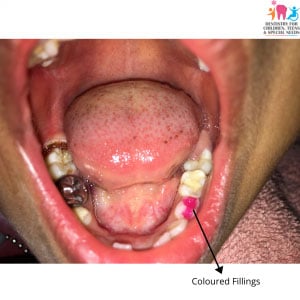
Why Do Children Need Dental Fillings?
Pulp Therapy: What is Pulp, and why is it essential for your child's teeth?
The pulp is present in all teeth, but it is not visible to the naked eye. It is located at the center of the human tooth. The pulp is made of soft tissue which contains nerves, blood vessels, connective tissues, and other cells needed to maintain a healthy tooth.
The pulp is nature’s alarm clock. If the tooth begins suffering from damage, the pulp increases the sensitivity of the tooth. It may even send out toothache signals to the brain. If the damage/decay is severe, the pulp may begin swelling.
The pulp is essential to maintain a healthy tooth
Why Do Kids Need Pulp Therapy?
Pulp therapy helps in restoring the damaged primary tooth in your kid’s mouth until it naturally falls out to make a place for the permanent tooth.
Pulp therapy not only restores the tooth, but it also makes the tooth functional again. This means that the child can chew or drink or talk without any pain. Once the child undergoes pulp therapy, they do not feel toothaches or increased sensitivity in that tooth. It also nullifies the chances of infection.
What Are The Types Of Pulp Therapy?
As a Pediatric Dentistry practice, we understand entirely that Root Canal for kids is probably the scariest thing for parents. But Dr Pratibha Kukreja – Pandit ensures that the child, as well as the parents, are comfortable during the pulp therapy sessions. She takes extraordinary efforts to make the procedure as pain-free as possible.
- Pulpotomy:A pulpotomy is performed when the decay is not very severe. In a Pulpotomy, the Pediatric Dentist will remove the damaged portion of the pulp, which in turn provides relief to the remaining healthy pulp. The tooth will be sealed with a special medicated filling, and a crown will be placed to protect the pulp and filling. The procedure is less invasive than Pulpectomy and has variable success rate. The tooth is put on a regular follow, every 6 months up until exfoliation.
- Pulpectomy:At Pandit Clinic, Pulpectomy is recommended only in cases where the damage to the tooth is very severe. The doctor will remove all of the pulp in the decayed tooth and clean out the root structure of the tooth. Once everything is cleaned, the root structure will be sealed with a special medicated filling. The filling will provide relief to the root. Finally, a crown will be placed, and a functioning tooth will be restored.
Root Canal For Children
. Dr Pratibha Kukreja, explains the standard procedure followed by dentists all over the world to diagnose whether Root Canal treatment is necessary for the patient.
Special Notes On Pulp Therapy
- Please follow all the instructions given by your doctor during pulp therapy sessions.
- In case your kid has been given antibiotics, make sure he/she takes them on time.
- Eat soft foods after the sessions.
- A follow up is advised every 3-6 months to ascertain positive outcome of the therapy.
Dental Crowns In Children
-
Stainless steel crowns :
The stainless steel crown (SSC) is an extremely durable restoration in Paediatric Dentistry. It has several clear-cut indications for use in primary teeth including:- Following a pulpotomy/pulpectomy procedure.
- For teeth with developmental defects.
- Teeth with large carious lesions/decay involving multiple surfaces where other fillings are likely to fail.
- For fractured teeth.
- There is evident literature suggesting its use in young children indicating that children at high risk exhibiting anterior tooth decay and/or molar caries may benefit by treatment with stainless steel crowns to protect the remaining at-risk tooth surfaces.
-
Pediatric preformed zirconia crowns:
Keeping abreast with technological advancements all over the world, Pandit Clinic Dentistry for children, teens and Special needs has included the newly introduced Paediatric zirconia crowns into their practice. We believe that smiles are a valuable asset to a child’s looks and Zirconia crowns provide a practical and successful solution for aesthetic needs in children with extensive loss of tooth structure. The procedure is simple and effective and presents a promising alternative for rehabilitation of decayed primary teeth (Especially in the front teeth). However, with its valued aesthetics, strength and durability, come some prominent disadvantages inherent to Zirconia as a material. Excessive tooth reduction and abrasive effect of the material against other teeth are some disadvantages of these crowns. Also, there is a major cost difference in the cost of these crowns as compared to other options. -
Paediatric Strip crowns:
Bonded celluloid strip crowns have been considered most patient compliant, esthetic and natural looking complete coverage restorations available for primary incisors. Though they are supremely esthetic when placed, their inherent drawback is technique sensitivity, low colour stability and low resistance to wear. At Pandit Clinic, we have restored many smiles using aesthetic strip crowns. -
Temporary acrylic crowns
A temporary crown is made from a resin or acrylic material using a molding or stent of the original tooth. This temporary crown is cemented with temporary cement so that it can come off easily once the permanent crown is ready. In adults, it is a routine procedure until a final permanent crown is received from the laboratory. In children, considering incomplete growth of jaws, a temporary acrylic crown is used as a long term interim option for restoration of carious, fractured, or discoloured Permanent incisors. The use of heat cure acrylic crowns as a long-term provisional restoration is well accepted and far common in permanent teeth. These acrylic provisional restorations provide acceptable mechanical and esthetical properties. The only drawback of these crowns is low colour stability and loose bonding to the teeth. At Pandit Clinic, we use the best in the line materials from 3M (Protemp) for our provisional restorations.
Dental Crowns For Children - Necessity, Procedure, Precautions
Minor Oral surgical procedures in children
-
Dental Extractions in children:
Tooth extraction is also known as Dental Extraction. The Pediatric Dentist removes the tooth from the socket in the alveolar bone. Dr Pratibha Kukreja – Pandit understands children’s psychology and the fear they may feel when a tooth is going to be extracted. She makes them comfortable and keeps their anxiety at bay with her positivity and child-friendly nature. We recommend tooth extractions when the tooth is severely damaged and cannot be restored. The damage could be due to decay, dental trauma or periodontal diseases. Sometimes tooth extraction may also become necessary when orthodontic procedures (braces) need to be performed. At Pandit Clinic, tooth extractions are not painful for the kids. They may experience slight discomfort after the procedure, but it will fade away soon. We recommend a diet of soft, cold and non-spicy food for 2-3 days once the extraction is done. We also recommend that you strictly follow the dentist’s advice after the extraction procedure. -
Jaw Cysts:
Jaw cysts are sac-like pouches that are filled with liquids. These are located inside the jaws. Cysts can form anywhere inside the human body and not just inside the mouth. Jaw cysts are generally benign in nature and non-cancerous. But a decisive answer can be given only after the doctor has examined the cyst or performed a biopsy on it. To know more about Jaw Cyst surgery, click here.
About Pediatric Prosthodontics
Prosthodontics is a dental specialty focused on restorative and cosmetic oral care. At Pandit Clinic, our Prosthodontists help with teeth restoration and replacement, as well as cleft lip and palate problems.
Our Prosthodontics section ably tackles cases of teeth restoration, replacement, dental crowns and bridges for children. We also offer dental implant services for kids. Prosthodontists play an essential role, especially in cases of trauma, tumours , accidents or dental injuries.
At Pandit Clinic, we take a holistic approach for children’s dental needs. Our Pediatric Dentist, Oral and Maxillofacial Surgeon as well as Prosthodontist work in tandem to offer our patients the best possible solution with minimal or zero pain.
Missing front primary/milk teeth
Front teeth lost due to caries or trauma can cause tremendous psychological trauma to the child and loss of self esteem. A removable or fixed (Groper’s) appliance can be used for the replacement of missing front primary teeth. In very young children, these appliances not only restore function and aesthetics but also aid in proper speech.
While removable appliances are easy to fabricate and require less mantainence, their utmost disadvantage is lack of patient wearing them. Patients can lose them and break them easily.
In contrast, fixed appliances cannot be removed by the patient. They require more maintenance and oral care. Routine follow up, every 3-6 months is advised for all kind of fixed appliances.
Missing permanent teeth before jaw growth completion
There are times when a permanent front tooth is lost due to unfortunate trauma, before the completion of jaw growth.
Also, at times permanent molars are lost due to caries, tumours, trauma or jaw cysts. In such cases a removable partial denture (RPD) is given to maintain the function, aesthetics and space until a final restoration can be planned and done. This needs to be followed up every 6 months and may need modifications or change as the jaw growth progresses.
Special Notes For Cleft Lip and Palate Cases and Obturator prosthesis
The Maxillofacial Prosthodontist is a dental specialist who makes artificial teeth and dental appliances to improve the appearance of individuals with cleft and to meet their functional requirements for eating and speaking.
The doctor may design customized oral appliance called ‘Maxillofacial obturator’ to facilitate closure of oronasal fistulas (Communication between nose and mouth) so that the child may speak normally. Our prosthodontist will coordinate treatment with the surgeon and/or the orthodontist to assure the best possible results.
At Pandit Clinic, we have been restoring smiles and speech for many children with cleft palate since years.
Burn injuries
These are specially designed appliances used to reduce burn contractures in children.
Virtual Video Consultations
100% SAFE AND SECURE CALLS WITH ENCRYPTION. YOUR PRIVACY AND CONFIDENTIALITY IS GUARANTEED.
Start here, by making an appointment for a virtual consultation with our expert Dr. Pratibha Kukreja Pandit (NEW PATIENTS ONLY).
Dr. Pratibha Kukreja Pandit is available for Virtual Video Consultations from Monday – Saturday between the hours of 11 am – 2pm and 4pm – 7pm.
If you are already our valued patient with questions or have an emergency please contact the clinic on +91 9822053446
Consult Dr. Pratibha Kukreja Pandit
(Pediatric Dentist)
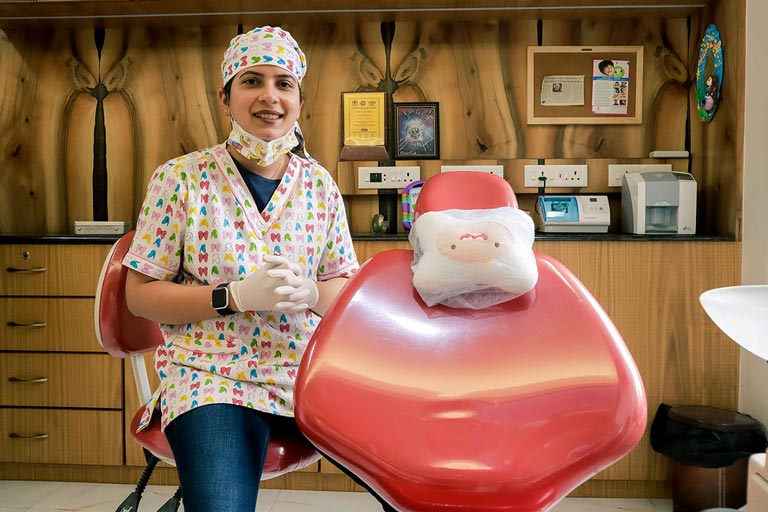
Virtual Video Consultation Fees Rs. 500
The Consultation Fees Must Be Paid Online by GOOGLE PAY BEFORE YOUR APPOINTMENT. See The Instructions On Appointment Confirmations
Your virtual video consultation includes:
- Discussion of problems that your child is facing like tooth pain, swelling or any other emergencies
- Dr. Pratibha will recommend a course of treatment or medications for your child.
Meet the Doctor
Pediatric and Preventive Dentistry Specialist
Dr. Pratibha is the Chief Dentist at Pandit Clinic. She is also a Consultant Pediatric Dentist at Kotbagi Hospital and KEM Hospital, Pune.
Dr. Pratibha has trained at the prestigious Chang Gung Memorial Hospital, Taiwan, in advanced areas including Pediatric dental treatment under General Anesthesia and Intravenous sedation, Dental Rehabilitation of children with special health care needs, and Nasoalveolar molding and dental rehabilitation of cleft lip and cleft palate.
She’s the lifetime member of Student Clinician Association, American Dental Association (SCADA), USA.
Professional Affiliations and Skills
- Trained in Pediatric dental treatment under General Anesthesia and Intravenous sedation at Chang Gung Memorial Hospital, Taiwan
- Trained in Dental Rehabilitation of children with special health care needs at CGMH, Taiwan
- Trained in Nasoalveolar molding and dental rehabilitation of Cleft lip and Cleft Palate at craniofacial centre, CGMH, Taiwan
- Awarded Lifetime membership, SCADA (Student Clinician Association, American Dental Association), USA.
You Might Be Interested In
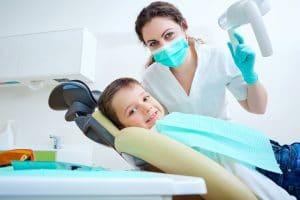
Your Child’s First Dental Visit
Call us +91 7888229284 Home Pediatric Dentistry Your Child’s First Dental Visit A child’s first dental visit is a crucial milestone in his/her growing up.

Orthodontics
Call us +91 7888229284 Home Pediatric Dentistry Orthodontics Orthodontic treatments help to prevent and correct misaligned teeth, crooked teeth, bite irregularites and other such issues

Pediatric Dental Treatments Under General Anaesthesia
Call us +91 7888229284 Home Pediatric Dentistry Paediatric Dental Treatments Under General Anaesthesia Pandit Clinic, Pune’s best Paediatric Dentistry practice led by Dr Pratibha Kukreja



